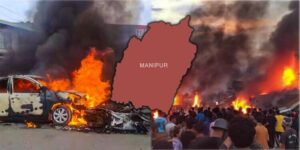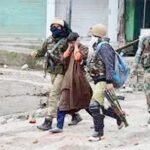 Moon Desk: The fragile ethnic landscape of India is best exemplified by the Manipur crisis, especially in the years since the BJP came to power in 2014. The indigenous tribal community has been subjected to state-sponsored persecution on a constant basis throughout history. An outspoken backlash against a court decision that threatened to significantly change the demographic make-up of the State set off the crisis, which took place on 3 May 2023. Manipur, a state in northeastern India, is encircled by wild mountains and shares a border with Myanmar. The Meitei ethnic group, which dominates the region and is largely Hindu, lives in the central valley. The Kukis and Nagas, two tribal groups that primarily practice Christianity, live in the mountainous regions, in contrast. The coexistence of the minority Muslim population in this multi-ethnic mosaic only adds to the complexity and conflict in the region.
Moon Desk: The fragile ethnic landscape of India is best exemplified by the Manipur crisis, especially in the years since the BJP came to power in 2014. The indigenous tribal community has been subjected to state-sponsored persecution on a constant basis throughout history. An outspoken backlash against a court decision that threatened to significantly change the demographic make-up of the State set off the crisis, which took place on 3 May 2023. Manipur, a state in northeastern India, is encircled by wild mountains and shares a border with Myanmar. The Meitei ethnic group, which dominates the region and is largely Hindu, lives in the central valley. The Kukis and Nagas, two tribal groups that primarily practice Christianity, live in the mountainous regions, in contrast. The coexistence of the minority Muslim population in this multi-ethnic mosaic only adds to the complexity and conflict in the region.
However, the Meitei are the numerically dominant group in the state, making up 54% of the total population. Tribal communities make up 40% of the population, and various smaller groups make up the remaining people. The central government granted them the coveted Scheduled Tribes (ST) status because of their distinctive tribal way of life, in an effort to preserve their distinctive cultural heritage. They are granted certain privileges as a result of their ST status, including exclusive land authority in mountainous areas, which has become a major source of contention. The Meitei, who make up the majority of the population, continue to reside in the central valley, which only makes up 10% of the state’s total area. t: 0:36
The main reason for hostility and tension in the state is this contrast between the Meitei, who live in the valley, and the hill tribes. The alleged one-sided narrative spread by the BJP’s extreme Hindutva politics, however, is what makes the situation worse. Even if minority communities ostensibly support the government’s agenda, whereas, critics contend that the ruling party’s strategy appears to favour majoritarian interests, marginalizing their rights and concerns.
Sadly, the central government’s glaring silence in the wake of the Manipur tragedy serves as a metaphor for the perceived flaws in their purported democratic system. Therefore, critics claim that India is quickly assuming the features of a fascist majoritarian state, where the rights and interests of minority groups have been placed in a subordinate position. This situation is especially troubling when even those who could be viewed as allies of the political system find themselves ignored and marginalized.
The Manipur crisis essentially serves as a sobering warning about the fragility of India’s wide range of ethnic groups which is made worse by the BJP’s divisive politics and its extreme ideology. Moreover, the government’s response has been to impose a permanent curfew and implement a thorough internet ban, rather than dealing with the people’s justifiable complaints. Unfortunately, this lockdown has had terrible side effects, including a lack of food and a breakdown in communication. Despite the government’s claims that such actions are required to stop violence, the Kukis’ issues have only grown worse as a result of these measures. The government’s actions have essentially only fuelled the fire, perpetuating a cycle of suffering and hopelessness within the Kukis community, rather than fostering peace and understanding.





